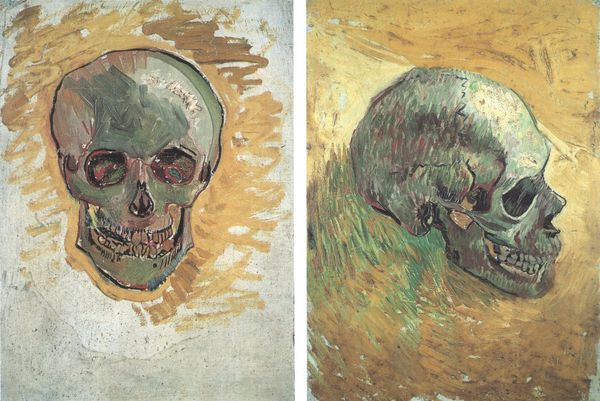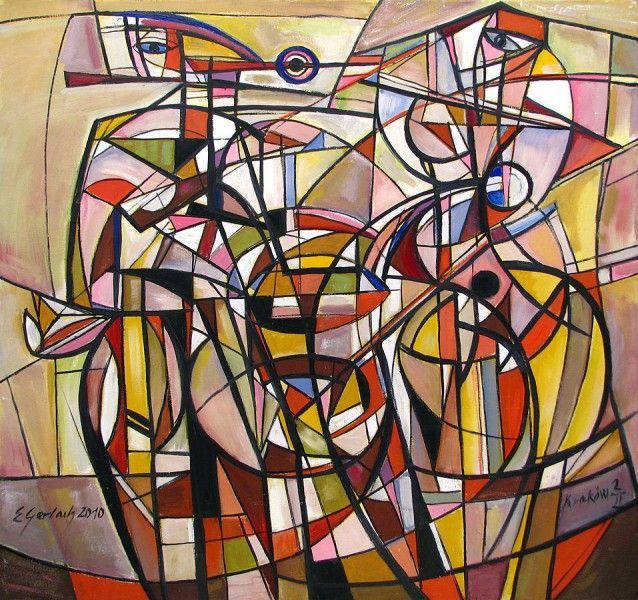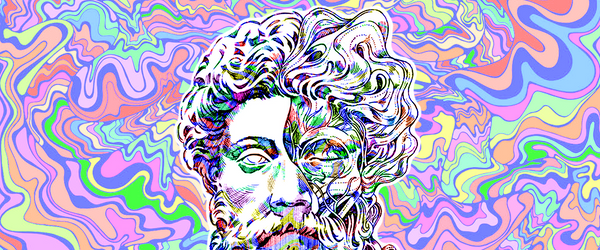Jordan Bates • • 11 min read
We Are Verbs: Human Existence as Perpetual Becoming

I live on Earth at present, and I don’t know what I am. I know that I am not a category. I am not a thing — a noun. I seem to be a verb, an evolutionary process — an integral function of the universe.
R. Buckminster Fuller
If you ask my parents, they’ll tell you that I came into this world a fragile, naked infant in an Iowa hospital on March 25, 1991. But what, precisely, links me to that infant? I mean, I have different cells, different thoughts, a different physique, etc. What necessary conditions are fulfilled by my current self, such that I and that tiny child can be confidently declared one and the same?
For centuries, philosophers have debated this and other metaphysical questions surrounding the topic of personal identity. These questions are tantalizing, but as one finds (perhaps surprisingly) upon investigation, the issues are quite complex, and little consensus exists as to what makes me me, what makes a person a person, what it takes for a person to persist in time, etc. etc. Acknowledging these philosophical problems seems like a worthy starting point for this essay, as my intent here is to submit to you a re-imagining of a common intuition about qualitative identity—namely, that it is static.

For the sake of simplification, let’s take for granted, as most people do, that persons persist in numerical identity—that in some significant sense I am the capricious three-year-old throwing spaghetti on the floor and the mischievous seven-year-old planting rubber snakes to frighten my mother.
Even though I am the same person, it is indisputable that I do not possess the same consciousness as those younger versions of myself. Since that time, I have encountered innumerable people, experiences, dreams, books, films, artifacts, cultures, beers, and landscapes that have continuously shaped and reassembled my perception, cognition, memory, knowledge-base, etc. In this very moment, the act of writing and thinking about this essay or of doing anything continues to subtly remake my consciousness in imperceptible, yet arguably significant, ways.
In the opening quote, renowned architect and writer Buckminster Fuller succinctly describes his conception of himself as a function of the universe—an ongoing process rather than a static or separate entity. Fuller conceives of himself as a “verb”, rather than a “noun”. We can understand this to mean that he sees the universe not as a collection of objects but as a bundle of processes, with ‘human-ing’ being one of those processes—one in which humans are always arriving, changing, evolving, becoming, fading away.
I find this perspective useful, but it is not necessary to adopt Fuller’s linguistic metaphor to appreciate that we humans, indeed, are not static but dynamic entities. We are constantly interacting with, changing, and being changed by everything around us. As I’ve already suggested, consciousness (and the physical body) is in a perpetual state of reassembly, always becoming. Adjusting one’s self-conception to account for this truth may be profoundly liberating, as we’ll see.
Destinations be Damned, Forever Rearranging
When we attune to this flux of consciousness, it becomes clear that any mental destination is an illusion. We are prone to gazing at the future and identifying certain circumstances that, once attained, will be a sort of symbolic victory for us, an end to a particular obstacle course that we’ve set for ourselves. We see ourselves reaching “success” or “retirement” or “marriage” and imagine that we will then finally be where it is that we need to be—i.e. “happy”. From that point, things will simply jibe.
But when we perceive that we will never cease to become, it is apparent that each of these symbolic destinations will ultimately prove impermanent. Our environment, our relationships, and our perspectives will remain in flux, and with this flux will arise new difficulties, new directions, new understanding. We can take pride and revel in the accomplishments of each passing stage of life, but time will demand that we continue to roll and change.
Nevertheless, many people reach certain milestones and cling to them, attempting to remain precisely the person they were when they were 17 or 24 or 29—to act and think and feel exactly as they did that idyllic summer after high school or on their wedding day or when they quit their job. Anaïs Nin, the great French-born novelist, wrote of this phenomenon:
“Life is a process of becoming, a combination of states we have to go through. Where people fail is that they wish to elect a state and remain in it. This is a kind of death.”
To latch onto and aim to maintain a particular state or stage of life is an untenable fantasy and a deliberate rejection of potential metamorphoses. Whether we wish it or not, existence is always interfacing with and altering us, as we are it. To accept this truth is to reorient oneself away from delusions of destination. To deny it is to reject the opportunities offered by change, to yield to what Nin calls “death.”
Where to Turn, Mama?
But if we are to turn away from investing in destinations, where should we turn? If we can never pause our lives at any one halcyon milestone, how are we to find consistent happiness?
First, consider that happiness may not be the highest aim of life or a consistent phenomenon. If this sounds a little bleak, it need not. Maybe “happiness”, if the word means anything at all, refers to something that ebbs and flows in time. As many a philosopher and writer have observed, the absence of happiness may well be that which gives sweetness to its presence. Pain may be essential to (among other things) grasping the goodness of what we have.
Perhaps a perpetual quiet contentment—viewing any situation as enough—is a wiser aim. If contentment is what we’re after, we certainly don’t have to sacrifice it by deciding that endless becoming negates permanent destinations. Instead of projecting happiness onto some nostalgia-saturated past event or highly anticipated future milestone, we might try turning our awareness to being content with the activity or experience or situation of this moment. As the Taoist poet-philosopher Lao Tzu wrote:
“Be content with what you have; rejoice in the way things are. When you realize there is nothing lacking, the whole world belongs to you.”
Read: The Tao Te Ching & Taoism: A Chill Book, a Chill Philosophy
If consciousness is indeed revising itself each second, it does seem to follow that equanimity arises from learning to be okay with the widest array of possible states of affairs or states of mind. Furthermore, a lack of permanent destinations seems to entail a re-formulation of certain questions. Instead of asking ‘What do I want to be in life?’ or ‘Where do I want to be in 10 years?’, we might ask ‘What do I want to be and do today?’ or ‘What sounds meaningful this moment?’.
If we direct our intention toward doing (when possible) that which seems meaningful right now and noticing that any outcome is enough, we might discover a terribly obvious yet effective strategy for perpetual contentment. Joseph Campbell, the much-lauded comparative mythologist, expounded a similar approach which he summed up in the phrase “follow your bliss.” He felt that the uncompromising pursuit of meaning-and-joy-bringing endeavors was a sort of existential keystone for navigating human life:
“Follow your bliss and the universe will open doors for you where there were only walls.”
A word of caution: in his later years, Campbell’s “follow your bliss” phrase was misconstrued as encouraging pure hedonism, to which he reportedly grumbled, “I should have said, ‘Follow your blisters.’” So, it isn’t that an awareness of the future and our physical and mental health should crumble in favour of total pleasure-seeking, but that we ought (to whatever extent possible for us) to aim to construct our lives around the activities and pursuits that, despite our ever-changing thought-scape, continuously move us (and, hell, maybe do some good too).
Holy Possibilities, Batman!
Of course to do this—to open ourselves up to changing and living according to the meaning of the present month or moment—is a frightening proposition. If we do, we will surely witness our tastes and whims recycle and transform. We will watch as our personalities modify in subtle ways. And although a small number of passions might stay with us throughout our lives, many more will certainly fall away or be replaced. In other words, to admit that in this second I am not a static being is to admit that I will be something different tomorrow, something unknown a year from now, and possibly something unrecognizable to myself in a decade.
This notion is uncomfortable because it forces us to countenance the passing of time, the fading of past selves, our eventual physical death. To change is to vacate the past and move ever-closer to the end of our story. It’s no wonder that we bury our proverbial talons in the interests, attributes, memories, and tendencies of our past selves and insist that “who we are” has long been established.
But what might we become if we accept that, in the grammar of the universe, our nature is verb-like, transitory, ever-moving? We might become anything. The possibilities are endless and exciting. As if to mirror the form of every great story, perhaps the substance and purpose of a life well-lived is real transformation. The French philosophical giant, Michel Foucault, thought so:
“I don’t feel that it is necessary to know exactly what I am. The main interest in life and work is to become someone else that you were not in the beginning.”
Buckminster Fuller, the man quoted at the beginning of this essay, is, in fact, a remarkable example of a once stagnated individual who underwent an unparalleled transformation. Once terribly depressed and on the verge of suicide, Fuller had a sort of epiphany and went on to become a visionary architect, systems theorist, author, designer, and inventor.

The Sticky Past
As has been touched upon in the previous, one issue that can be disastrously antithetical to rejecting destinations, embracing transformation, and finding contentment in ceaseless becoming is an inability to relinquish a stranglehold on the past.
After all, it seems natural to hold tightly onto the past. We tend to feel that if don’t have the past, we don’t have anything. Our pasts provide all of the context with which we are equipped to navigate the present. Without our memories and stories, we would indeed be directionless and alone. But it seems that we often overcompensate, desperately clinging to the “good old days”, trying to relive them in our minds, and simultaneously attempting to freeze the present moment, to capture the past before it becomes the past. This latter point can be plainly observed in our modern tendency to photograph even the most mundane of moments and to record hours of video that we’ll never revisit.
But if we spend significant amounts of time trying to immortalize and live vicariously through the past, we may relinquish a measure of ability to see the possibilities of the present and future. We may cease to capitalize fully on the surrounding opportunities for novel experiences, reflection, and appreciation. We may eschew the potential to become a marvelously different-yet-somehow-still-the-same version of ourselves. So we ought to be cautious.
Conversely, a second issue with the past is the predicament of feeling guilt and shame over our past actions. Many of us expend our present thoughts and energies regretting and brooding over past mistakes, using one-time events as benchmarks by which to reduce our present selves, to convince ourselves that who we are has already been determined by those past errors. The psychologist Albert Ellis had a lot to say about this phenomenon:
“. . .[An] individual has done a wrong act. The only real purpose of his admitting to himself that he did this act—as far as I can see—that it was wrong, is to change his behavior in the future. Not to cry and wail and beat his breast because he’s done it in the past but to do differently, not to commit another similar wrong act in the future. This is the whole essence of what we call morality. How do we get people to be moral—meaning that they will commit, we hope, few wrong acts in the first place, but being human they will commit them, and then later they’ll be able to change and commit fewer of these in the second place?
Now as long as you say . . . “I did wrong,” you’re still on the right track because you’re never going to change your behaviour unless you admit that there is something wrong with it. But as soon as you say . . . “I am a louse for doing wrong. I am a blaggard. I am no good. I should be punished. I am unworthy. I am undeserving.” . . . then certain things happen to a human being, and these things that happen are the antithesis of correction of his behavior.”
Ellis’ thesis concerning guilt and shame is fairly straightforward. As humans, we will f*** up. It’s a foregone conclusion. The deck was rigged against us. Therefore, our necessary, isolated mistakes do not make us evil; they make us human. What we once did need not become a box in which we forever encase and compartmentalize ourselves. In fact, dwelling on past actions, convincing ourselves that those actions define us, and falling into anxiety or depression, as a result, is utterly incompatible with reparation.
Self-condemnation immobilizes us, presses us firmly into the muck of the past. Presumably we are upset about our actions because we don’t want to be a contemptible person. But if our goal is to do “right” (however you define that word), choosing to reside in the past stifles our forward motion and prevents us from focusing on correcting the behavior. And correcting future behavior, as Ellis points out, is the sole practical application of any moral consideration.
To come full circle with this point, recall that we are ever in the process of becoming and that our past actions were made under the influence of a demonstrably different consciousness. In this light, it’s possible to see that our regrettable actions catalyzed the formation of deeper empathy and ethical awareness. We can distinguish between the more ignorant past self and the present, more refined self, and to see that the only morally pragmatic choice is to admit the wrongdoing of the past self and resolve to do better now and in the future. We need not classify ourselves as villains and become guilt-slaves to the actions of consciousness we no longer possess.
You’re a Verb, Harry
In sum, my assertion here is that you and I are processes of becoming, and that choosing to see ourselves in this way can have radical effects on our understanding of contentment, transformation, the past, and the future.
Integrating this idea into my own life has been a gradual and ongoing process of attempting to reorient my thought and action away from the past or future—consciousnesses that no longer or do not yet exist—and toward the activities and environments available to me presently. I maintain that this is not the same as “mindfulness” or “presence”, which refer to concentrating wholly on the sensory data of the present moment.
While I do practice mindfulness intermittently, I also spend a good deal of my time reading, writing, and thinking in ways that take me far away from the sensations of the moment into a world of abstraction, imagination, and possibility. The crux here is that I aim to expend a tiny minority of this mental energy reliving the past or mapping out the destinations of the future. (That’s not to say that I never do those things or that they aren’t ever worthwhile. They are, I think.)
Read: Why Free Writing Is Better Than Meditation
Instead, I endeavor (sometimes unsuccessfully) to immerse myself in the experience of the hour, be it physical or intellectual or aesthetic, and to open myself up to the meaning and transfiguration that might arise therein. The more I’m able to do this, the more I seem to feel that, though changing, I am precisely where I need to be.
This post was originally published on www.refinethemind.com

Jordan Bates
Jordan Bates is a lover of God, father, leadership coach, heart healer, writer, artist, and long-time co-creator of HighExistence. — www.jordanbates.life


![Seneca’s Groundless Fears: 11 Stoic Principles for Overcoming Panic [Video]](/content/images/size/w600/wp-content/uploads/2020/04/seneca.png)







